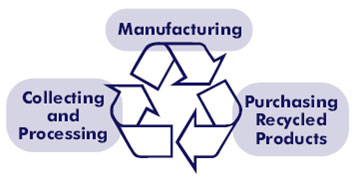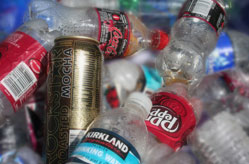
Source: The Quest for Less, Chapter 2, Section 2, Environmental Protection Agency

Source: The Quest for Less, Chapter 2, Section 2, Environmental Protection Agency
"Recycling is a series of activities that includes the collection of used, reused, or unused items that would otherwise be considered waste, sorting and processing the recyclable products into raw materials, and remanufacturing the recycled raw materials into new products. Consumers provide the last link in recycling by purchasing products made from recycled content. Recycling also can include composting of food scraps, yard trimmings, and other organic materials." - U.S. Environmental Protection Agency
Glass, plastics, paper, aluminum, steel, and some electronics are considered recyclable products. Even recycling cell phones helps the environment. It saves energy and keeps usable materials out of landfills. Cell phones and PDAs are made of precious metals, copper, and plastics-all of which require energy to manufacture and mine. Recycling conserves these materials so they can be turned into new products. Recycling has a number of benefits that help both the environment and the economy.

Source: Recyclable Materials, University of California
Recyclable materials can be collected in a variety of ways. There is curbside collection in neighborhoods, business collections, drop-off centers, etc. Check with your local community to determine what recycling facilities are available and what products can be recycled at those facilities.
Use your notes to answer the following questions.


